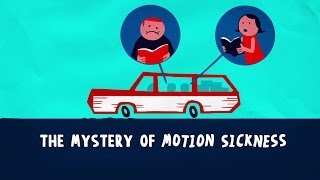(单词翻译:单击)
Can you read in the car? If so, consider yourself pretty lucky.
你可以在车上阅读吗?如果可以的话,你算是挺幸运的了。
For one-third of the population,
因为对大约1/3的人口来说,
looking at a book while moving along in a car or a boat or train or plane quickly makes them sick to their stomach.
在移动中的汽车上、船上、火车上、或者飞机上阅读,很快就会让他们觉得反胃恶心。
But why do we get motion sickness in the first place?
但是首先,我们为什么会有这种“晕动症”呢?
Well, believe it or not, scientists aren't exactly sure.
这个嘛,信不信由你,其实科学家都不是很确定。
The most common theory has to do with mismatched sensory signals.
最广为接受的理论是晕动症跟感官讯号错配有关。
When you travel in a car, your body gets two different messages.
当你坐到车上,你的身体会接受到两种非常不同的信息。
Your eyes are seeing the inside of a vehicle, which doesn't seem to be moving.
你的眼睛看见车的内部,感觉车好像没有在动。
Meanwhile, your ear is telling your brain you're accelerating. Wait, your ear?
同时,你的耳朵却在告诉你的脑袋你在加速的状态中。等等,你的耳朵?
Your ear has another important function besides hearing.
对呀,你的耳朵其实除了听觉外还有另外一个重要的作用。
In its innermost part lies a group of structures known as the vestibular system,
在它最深处的位置有一组架构叫作前庭系统,
which gives us our sense of balance and movement.
给予人们平衡和动感的感知。
Inside there are three semicircular tubules that can sense rotation, one for each dimension of space.
这个系统里面有三条半圆细管以感知转动,每一条都负责一个空间维度。
And there are also two hair-lined sacks filled with fluid.
另外系统还有两个有毛发排列的囊袋,里面充满液体。
When you move, the fluid shifts and tickles the hairs,
所以当你移动时,液体也会跟着移动并触动到毛发,
telling your brain if you're moving horizontally or vertically.
告诉你的大脑你到底是在横向移动还是垂直移动。
All this tells your body which direction you're moving in, how much you've accelerated, even at what angle.
把这些元素结合一起,身体就会感知你往哪边移动,加快的速度有多少,甚至是在什么坡度上移动。
In a car, your vestibular system correctly senses your movement,
所以,当你坐车的时候,你的前庭系统能够准确地感知到你在移动,
but your eyes don't see it, especially when glued to a book. The opposite can happen.
可你的眼睛却看不到这个状态,尤其是当你的注意力停留在书本上的时候。相反的情况也可能出现。
You're at the movies, and the camera makes a sweeping move.
譬如说,你坐在电影院里,电影有个镜头是快速横扫整个场景的。
This time, your eyes think you're moving while your ear knows you're sitting still.
这次,是你的眼睛认为你在移动,而你的耳朵则知道你其实稳坐不动。

But why does this conflicting information make us feel so terrible?
可为什么这种相互矛盾的咨询会让我们如此不适?
Scientists aren't sure, but they think there's an evolutionary explanation.
科学家其实也没有一个确定的答案,但是他们认为这个现象可以跟人类进化问题有关。
Fast moving vehicles and video recordings have only existed in the last couple of centuries, a blink in evolutionary time.
我们知道,快速移动的交通工具和拍摄录影都只在最近的两个世纪才出现,从宏观来讲其实跟眨一下眼没有分别。
For most of our history, there wasn't that much that could cause this sensory mix-up, except for poisons.
在人类的历史上,也没有那么多情况导致这种感官混淆的问题发生,除了毒药之外。
And because poisons are not the best thing for survival,
而因为毒药对生存不利,
our bodies evolved a direct but unpleasant way to get rid of what we ate that was causing the confusion.
我们的身体演化出一种直接但不怎么让人舒服的方法,来让我们摆脱我们可能吃进去而造成冲突的东西。
It's a pretty reasonable theory, but it leaves things unexplained,
这个理论看起来挺合理,但它留下很多部分没有解释。
like why women are more affected by motion sickness than men, or why passengers get more nauseous than drivers.
譬如,为什么女人比男人更受晕动症影响呢,再譬如,为什么乘客比司机会更容易恶心不适?
Another theory suggests that the cause is more about the way some unfamiliar situations
另一个理论解释说,背后的原因可能跟不熟悉的环境
make it harder to maintain our natural body posture.
使身体更难保持自然的姿势有关。
Studies show that being immersed in water or just changing your stance can greatly reduce the effects of motion sickness.
研究显示,沉浸在水中或单纯改变站姿,可以大大降低晕动症的不适。
But we don't really know what's going on.
不过我们不是很清楚真正原因。
We know the more common remedies for car queasiness -- looking at the horizon, over-the-counter pills, chewing gum,
我们知道的是晕车最常见的舒缓措施有--往地平线看,非处方药,嚼口香糖,
but none are totally reliable nor can they handle intense motion sickness
但这些方法并不完全可靠,也无法处理非常强烈的晕动症,
and sometimes the stakes are far higher than just not being bored during a long car ride.
而这方面的研究比是否会在长途车上因为不能读书觉得无聊,意义来得更重要。
At NASA, where astronauts are hurled into space at 17,000 miles per hour, motion sickness is a serious problem.
在美国国家宇航局,宇航员以每小时17000英里的高速进入太空,晕动症对他们来讲是一个严重的问题。
In addition to researching the latest space-age technologies,
因此,除了研究最新的太空科技,
NASA also spends a lot of time figuring out how to keep astronauts from vomiting up their space rations.
美国国家宇航局也花了大量时间尝试寻求方法,不让宇航员吐在他们小心准备的太空配给上。
Like understanding the mysteries of sleep or curing the common cold,
跟了解睡眠之谜和治愈普通感冒一样,
motion sickness is one of those seemingly simple problems that, despite amazing scientific progress, we still know very little about.
尽管科学进步神速,但晕动症仍然是其中一个看见来很简单,但是我们却了解很少的难题。
Perhaps one day the exact cause of motion sickness will be found,
可能终有一天我们会发掘晕动症的确切起因,
and with it, a completely effective way to prevent it, but that day is still on the horizon.
而因为它,有效避免这个问题的方法也会出现,但那一天仍在遥远的未来。


